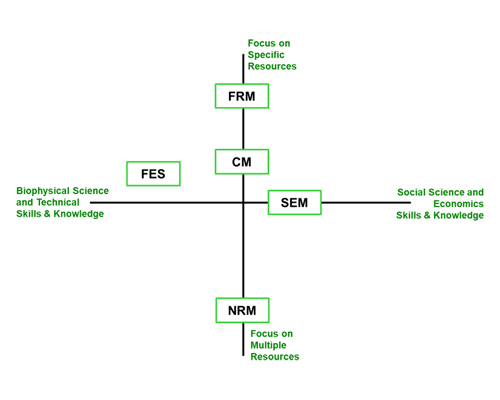Department of Sustainable Resources Management
Undergraduate Programs
Sustainable Resources Management programs prepare students for work with public and private sector organizations and consultancies, and for further professional or scientific study at the graduate level.
Students develop professional skills, which employers look for in new employees:
- Management skills including leadership, communication abilities, and teamwork;
- Scientific knowledge and technical skills in measurements and analysis for management;
- The ability to analyze and solve resource management problems using both social and biophysical sciences; and
- A clear understanding of ethics and stewardship.
These skills are best developed by a broad base in the social sciences and humanities, communication, the natural sciences, and quantitative and qualitative methods. Most coursework taken during the first two years (lower division) is in these basics. Students are required to complete general education requirements and a professional core.
Students interested in more information are encouraged to review the SRM Undergraduate Student Handbook.
Undergraduate Degree Programs
The Department offers five Bachelor of Science degrees.
Construction Management: The CM program emphasizes project-based learning, a focus on sustainability, and hands-on experience in a laboratory environment. The degree prepares students for management careers in the construction industry with an additional focus on sustainable construction management.
Forest Ecosystem Science: The FES program combines professional competency in forest management skills with an enhanced understanding of ecological sciences, and is accredited by the Society of American Foresters. Graduates of the FES program work in public agencies, private industry, and for nonprofit organizations.
Forest Resources Management: The FRM program combines professional competency with a strong foundation in the biophysical sciences, humanities, and social sciences to sustainably meet society's needs for forest managers. The program is accredited by the Society of American Foresters. The major prepares students to be well-rounded generalists who can practice forestry and succeed as professionals in a variety of allied natural resources management fields. Graduates work as professional foresters and natural resource managers in private industry, public agencies, and for nonprofit organizations.
Natural Resources Management: The NRM program is based on a vision that combines professional competency in management skills with a strong foundation in the social and biophysical sciences. Focused learning can be developed with water, recreation, and vegetation resources. Graduates work in public agencies, private industry, and for nonprofit organizations. Their duties range from policy analysis for federal agencies to resource management for nonprofit organizations, from recreation planning for state park agencies to recreation management in federal wilderness areas, and from watershed hydrologists to land managers maintaining surface water quality.
Sustainable Energy Management: The SEM program introduces students to a wide range of energy markets and resources, combining professional competency in management skills with a strong foundation in the social and biophysical sciences. Graduates work in the energy industry (for energy companies, utility companies, and renewable energy developers), for other private industry as sustainability consultants or energy managers, and for government and regulatory agencies (e.g., Department of Energy, NYSERDA, and local governments).

Minors
The programs offered by the SRM Department provide flexibility to allow students to minor in additional areas of interest. The department sponsors the following ten minors, and additional minors are available through Syracuse University and other departments at ESF.
- Applied Statistics
- Construction Management
- Economics
- Forestry
- Management
- Recreation Resource and Protected Area Management
- Renewable Energy
- Sustainable Construction
- Urban Forestry
- Water Resources
Refer to the Undergraduate Student Handbook or the College Catalog for more details about each minor.
Program Admission
Students may follow one of three paths to enter and complete an undergraduate degree program:
- Freshman Path
The freshman path is for students who enter ESF as freshmen and complete all degree requirements at ESF. - Transfer Path
The transfer path is for students who complete all or part of their lower-division coursework at another two- or four-year campus and complete the upper-division requirements at ESF. Students preparing to transfer to ESF with full junior status must have earned at least 60 credits of college coursework. SRM programs are designed to readily accommodate transfer credits. - Combined A.A.S / B.S. Path
The combined A.A.S./B.S. path is readily accommodated for students majoring in Forest Ecosystem Science, Forest Resources Management, and Natural Resources Management, and is available for other B.S. programs on campus as well. This path is for students who wish to have more field measurement and field skills, conceptually-based decision-making and problem-solving skills, and leadership development in context of natural resource problems. The first year can be at ESF or another campus and the second year is spent at The Ranger School on the Wanakena campus. Students then complete their B.S. degree requirements at ESF. The program can be completed in a total of four years with careful planning. Students interested in more information about transfer credits from Range School A.A.S. programs to SRM B.S. programs are encouraged to review the section in the SRM Undergraduate Student Handbook that describes transfer credits in detail.
